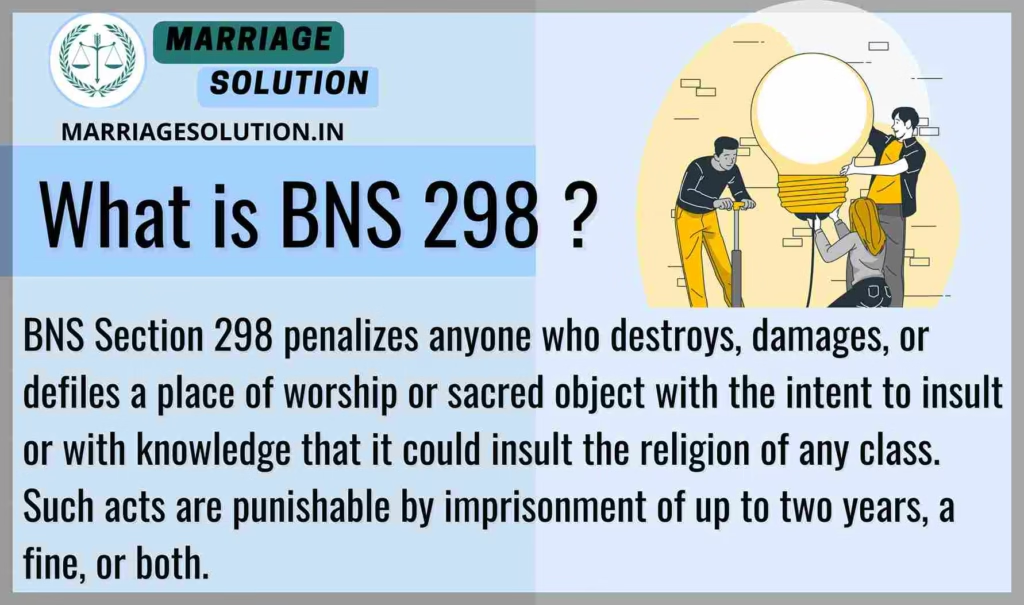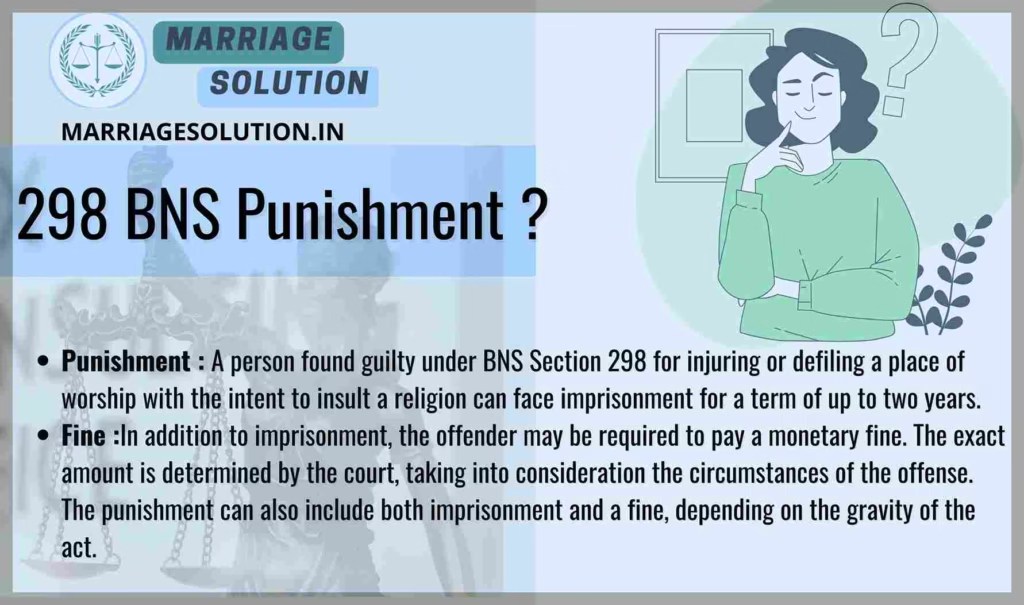Introduction of 298 BNS
BNS 298 deals with the offense of injuring or defiling places of worship or sacred objects with the intent to insult the religion of any class of people. This section safeguards religious sentiments, prevents deliberate disrespect, and promotes communal harmony in a diverse society like India. Replacing IPC Section 295, this provision ensures that all faiths are equally protected from intentional acts of insult or provocation.
The Bharatiya Nyaya Sanhita (BNS) Section 298 replaces the old Indian Penal Code (IPC) Section 295.
What is BNS Section 298 ?
BNS Section 298 penalizes anyone who destroys, damages, or defiles a place of worship or sacred object with the intent to insult or with knowledge that it could insult the religion of any class. Such acts are punishable by imprisonment of up to two years, a fine, or both.

Under Section 298 of the bns act 2023
“Whoever destroys, damages, or defiles any place of worship or sacred object, with the intent to insult, or knowing that such act is likely to insult the religion of any class, shall be punished with imprisonment up to two years, or with fine, or with both.”
1. Meaning of Section 298
- This section punishes acts of injuring, damaging, or defiling places of worship or sacred objects.
- The key element is intent or knowledge that the act will insult the religion of a class of people.
- It covers all religions, ensuring equal protection under law.
- The purpose is to maintain communal harmony and respect for religious sentiments.
2. Who is Covered?
This section applies to:
- Individuals – Any person who intentionally damages or desecrates a religious place or object.
- Groups – Organized acts of vandalism or disrespect toward a community’s sacred symbols.
- Protestors/Offenders – Those who use religious disrespect as a form of provocation.
- Anyone with Knowledge – Even if the intent is not direct, but the person knows their act could insult a religion, liability arises.
3. Nature of the Offence
- Cognizable → Police can arrest without magistrate’s prior permission.
- Non-Bailable → Bail is not a right; it depends on the court’s discretion.
- Non-Compoundable → Cannot be privately settled; trial is mandatory.
- Triable by → Any Magistrate.
4. Examples of BNS Section 298
- Example 1 – Temple Vandalism
A person intentionally breaks idols in a temple to insult worshippers → Punishable under Section 298. - Example 2 – Defiling Sacred Texts
Someone tears and burns pages of a holy book in public to provoke outrage → Covered under Section 298. - Example 3 – Desecrating Religious Symbols
Spraying offensive graffiti on a mosque or church wall with intent to insult → Offence under Section 298. - Example 4 – Knowledge-Based Offense
A person dumps garbage inside a shrine knowing it will insult that religion → Liable under Section 298, even if insult was not the direct intent.
5. Punishment under BNS Section 298
- Imprisonment → Up to 2 years.
- Fine → Court may impose a monetary fine.
- Both → Depending on severity, the court may award both jail term and fine.
6. Importance of BNS Section 298
- Protects the sanctity of religious places and sacred objects.
- Prevents actions that may lead to communal disharmony or riots.
- Ensures mutual respect among diverse faiths in India.
- Reinforces that intentional insult to religion is a serious crime.
Section 298 BNS Overview
BNS Section 298 addresses the offense of damaging, defiling, or destroying places of worship or sacred objects with the intent to insult the religion of any class. It aims to protect religious harmony by penalizing actions that deliberately disrespect or harm religious sentiments.
10 Key Points
- Protection of Religious Sentiments
BNS Section 298 ensures that every individual respects the religious beliefs of others. It protects the sanctity of places of worship and sacred objects, which hold deep spiritual significance for religious communities. By criminalizing acts of defilement or harm, the section seeks to maintain harmony among diverse religious groups. - Intent as the Basis of the Offense
The offense is not based on accidental actions but requires clear intent to insult the religion of a class. Alternatively, if a person knowingly performs an act that they are aware could insult a religion, they are equally liable. This focus on intent ensures that genuine errors or unintended actions are not criminalized. - Types of Acts Punished Under This Section
Acts like destroying a temple, damaging sacred idols, or defiling a holy book fall under this section. It encompasses any deliberate action aimed at disrespecting places or objects considered sacred by a particular community. The broad scope ensures comprehensive protection for all religious groups. - Punishment for Violations
A person found guilty under Section 298 may face imprisonment for up to two years, a fine, or both. This punishment serves as a deterrent, discouraging individuals from engaging in such disrespectful acts. The term of imprisonment and the amount of the fine can vary based on the severity of the offense. - Non-Bailable Nature of the Offense
The offense is classified as non-bailable. This means that the accused cannot secure bail as a matter of right but must seek the discretion of the court. The non-bailable status underscores the seriousness of the offense and its potential impact on public harmony. - Cognizable Offense Classification
BNS Section 298 is a cognizable offense, allowing police authorities to take immediate action without prior approval from a magistrate. This provision ensures that incidents are addressed swiftly to prevent escalation and maintain public order. - Applicability to Any Religious Community
This section is not limited to protecting a particular religion but applies universally to all faiths. It demonstrates India’s commitment to secularism and equality by ensuring that the religious sentiments of every community are equally safeguarded. - Trial Procedure
Cases under Section 298 are triable by any magistrate. This provides accessibility and ensures that even at the grassroots judicial level, such offenses can be addressed efficiently. This approach helps in providing timely justice to aggrieved parties. - Societal Importance of Section 298
The section plays a crucial role in maintaining societal harmony in a multicultural nation like India. By penalizing acts that harm religious sentiments, it fosters mutual respect and discourages actions that could lead to communal tensions or conflicts. - Focus on Awareness and Deterrence
Beyond punishment, Section 298 emphasizes the need for individuals to act responsibly and avoid actions that may insult others’ beliefs. It acts as a preventive measure, reminding citizens of the consequences of disrespecting sacred symbols or places of worship.
Examples of BNS Section 298
- Vandalizing a Temple
A person intentionally breaks the idols in a temple, knowing that it would insult the sentiments of the worshippers. This act falls under Section 298 as it defiles a place of worship with intent to insult a religion. - Defiling Sacred Objects
A person desecrates a holy book by tearing its pages in public, intending to provoke and insult the followers of that religion. This deliberate act also comes under the scope of Section 298.
BNS 298 Punishment
Punishment
A person found guilty under BNS Section 298 for injuring or defiling a place of worship with the intent to insult a religion can face imprisonment for a term of up to two years.
Fine
In addition to imprisonment, the offender may be required to pay a monetary fine. The exact amount is determined by the court, taking into consideration the circumstances of the offense. The punishment can also include both imprisonment and a fine, depending on the gravity of the act.

BNS 298 bailable or not ?
BNS Section 298 is non-bailable, meaning the accused does not have the right to bail automatically. The decision to grant bail lies solely with the court, which considers factors like the seriousness of the offense and its impact on public order before making a decision.
Comparison: BNS Section 298 vs IPC Section 295
| Section | What it Covers | Punishment / Fine | Exceptions | Bailable / Cognizable | Trial By |
|---|---|---|---|---|---|
| BNS Section 298 | Covers injuring, defiling, or destroying any place of worship or sacred object with intent or knowledge to insult a religion or class. Protects all faiths and religious harmony. | Imprisonment up to 2 years, or fine, or both. Court decides punishment based on severity and intent. | No specific exceptions, but unintentional acts or lack of intent to insult are not punishable. Focuses on deliberate or knowing acts. | Non-bailable & Cognizable | Any Magistrate |
| IPC Section 295 (Old) | Punished injuring or defiling places of worship with intent to insult religion of any class. Did not explicitly include sacred objects. | Imprisonment up to 2 years, or fine, or both. Similar punishment but narrower coverage. | No mention of exceptions; interpreted through case law. Limited to places of worship only. | Non-bailable & Cognizable | Any Magistrate |
| Key Difference: BNS Section 298 modernizes IPC Section 295 by including sacred objects in addition to places of worship, broadening protection for all religions. It strengthens safeguards for religious sentiments and promotes communal harmony. | |||||
BNS Section 298 FAQs
What does BNS Section 298 address?
It addresses acts of harming or defiling places of worship or sacred objects with intent to insult a religion or religious class.
What punishment does BNS Section 298 prescribe?
The punishment can be imprisonment of up to two years, a fine, or both, depending on the severity of the offense.
Is BNS Section 298 a bailable offense?
No, it is a non-bailable offense due to its serious nature.
What type of offense is classified under BNS Section 298?
It is a cognizable offense, allowing police to take immediate action.
Who tries cases under BNS Section 298?
Cases are triable by any magistrate, ensuring accessibility to the judicial system for resolving such matters.
Can unintentional acts be prosecuted under BNS Section 298?
No, the section specifically addresses intentional acts or those performed with knowledge that they could insult a religion.
Conclusion
BNS Section 298 plays a vital role in preserving the sanctity of religious places and sacred objects while promoting mutual respect among communities. By penalizing deliberate acts of insult, it ensures that no religion or faith is disrespected in India’s secular framework. This law not only punishes offenders but also acts as a reminder that religious harmony is essential for national unity. Staying aware of such provisions helps every citizen contribute to peace and respect in society.
Need Legal Support?
If you are dealing with court cases, marriage problems, or any other legal issue, our team at Marriage Solution – Lawyer Help is here for you. Simply fill out our quick online enquiry form, and we’ll connect you with the right legal expert to support your needs.
Finished with BNS 298 ? Continue exploring the next provisions of the Bharatiya Nyaya Sanhita (BNS), 2023. Each section includes explanations, examples, and plain-language breakdowns for easy understanding.
- 299 BNS : Deliberate and malicious acts, intended to outrage religious feelings of any class by insulting its religion or religious beliefs.
- https://marriagesolution.in/bns_section/299-bns/
- 300 BNS :Disturbing religious assembly.
- https://marriagesolution.in/bns_section/300-bns/
- 301 BNS :Trespassing on burial places, etc.
- https://marriagesolution.in/bns_section/301-bns/
- 302 BNS :Uttering words, etc., with deliberate intent to wound religious feelings of any person.
- https://marriagesolution.in/bns_section/302-bns/
Full IPC Section List: https://marriagesolution.in/ipc-section-list
All Indian Law & Blogs: https://marriagesolution.in/indian-law/
Full BNSS Section List: https://marriagesolution.in/bnss_section-list
